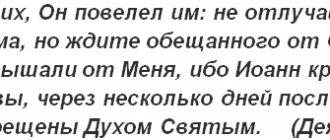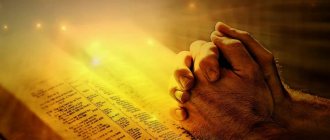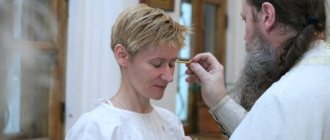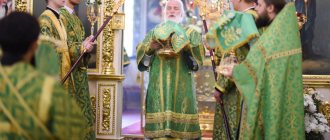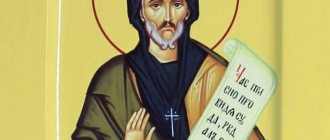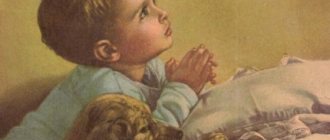Prayers of the Jewish People
Obligatory prayers were not present in Biblical Judaism. If any of the heroes of Scripture addressed the Almighty, he did so in his own words. The first Jewish prayers with standard texts did not appear until the Second Temple era.
What is their strength?
Jews believe that the power of prayer is so great that with its help any miracle can be performed. Jewish believers believe that sincere prayer chants reach heaven and significantly influence the decision of the Higher Powers.
The rituals of Judaism are very specific. They cover all areas of a believer’s life. For example, the Jewish faith prescribes that any action must be accompanied by praise to the god Yahweh.
The power of any Jewish prayer lies in the fact that it allows you to get closer to the Creator. A prayerful appeal to the Almighty allows you to open the gates to the Heavenly Treasury. If a person has already been destined for something and can achieve his goal on his own, then he still will not receive it until he prays.
It is very important to deeply understand the words of prayer, because it is the logical conclusion of any life action. For prayer to be effective, one must constantly improve oneself. By studying the Torah, a person comprehends the wisdom of the Creator, and, therefore, constantly moves upward, overcoming step by step.
The difference between prayer in Hebrew and Orthodox
Orthodox prayers emphasize the importance of a person's faith. When faith is present in the soul, then you can count on forgiveness of sins, which means you can receive hope for Eternal Life after death in Heaven. Jewish prayers emphasize that serving God through certain actions is more important than faith itself. That is, faith should not be manifested only in prayerful words, it must be confirmed by specific actions in real life.
When turning to God in Orthodox Christian prayers, a person connects him with Jesus Christ, who was a man during his lifetime. Jewish prayer completely denies the possibility of seeing God in human form. Therefore, all prayer appeals are directed to the invisible force that controls the world.
Another difference in Jewish prayer is that the believer, through prayer, establishes a dialogue with God. A prayer address cannot be considered a monologue according to Jewish concepts. At the same time, every Jew understands that God is absolutely holy and incredibly exalted above all living things. The Lord controls the world in all its manifestations, and man is just a weak and ignorant creature created by the Creator. And despite this, through prayer, personal contact with God is established. Words from a believer are sent to God in the form of prayer phrases and thoughts, and the answer of the Almighty is everything that happens to a person after prayer.
Service
At an even higher level, prayer becomes a service (עבודנ, “avodah”). The Torah commands us to “serve G‑d with all our hearts.” In this regard, our sages say: “What is the service of the heart? - prayer." In this sense, prayer means: to purify our hearts and our morals.
Avodah literally means “work.” We work on raw material and transform it into an improved finished product. In the process of processing, we remove impurities or roughness from a raw material, be it a piece of wood or a rough diamond, and transform it into a useful or beautiful thing. A tanner, for example, takes a raw hide and turns it into fine leather through various processing processes. The parchment on which the Torah Scroll, mezuzah, or tefillin is written is made from the skin of a kosher animal. The same thing happens with raw wool, which is full of dirt and other impurities, and with the help of various types of “working” it turns into fine and elegant wool, from which we can make not only fine woolen fabric for our clothes, but also tallit or tzitzit.
The Jewish people are equated in the Torah to sand and earth and are called G-d’s “desired land.” Holy Baal Shem Tov. founder of Hasidism, explains it this way: the earth is full of treasures, but these treasures are often deeply hidden. It is necessary to get to the bottom of them; and when they are taken out of the depths, they still need to be cleaned of waste, then polished or polished, as in the case of gold or diamonds, etc. In the same way, every Jew is endowed with wonderful treasures of character - modesty, kindness and other good natural traits, but sometimes they are hidden deep and covered with "soil" and "dust" that need to be removed.
A person of good character we call a "refined" person or a person of "refined" character. It takes effort, and sometimes great effort, to overcome, for example, inclinations such as pride, hot temper, jealousy and similar bad character traits, which may be very “natural”, but not befitting a human being in general, especially a Jew.
Tefilah in the sense of avodah is the “laboratory” where human character traits are purified from foreign impurities. Bad character traits come from the “animal” soul of a person and are completely “inherent” to it. But we are also endowed with a “Divine” soul, which is a spark of God himself and a treasury of all the wonderful qualities that place man above the animal. During prayer, our Divine soul turns to God, and then even the animal soul is full of holiness. We realize that we are in front of the Holy One (blessed be He), and at that moment the entire material world with all its pleasures and sufferings disappears. We perceive the "real" things that really matter and are truly important, and even when we ask for our lives, health and needs, we consider them in their deep meaning: a life - worthy of being called "life"; health - not only physical, but above all spiritual; needs - that which is truly capable of supporting our existence in this world and in the world to come, namely: the Torah and the commandments.
By such “service” we feel purified, and when we return to our daily affairs, the feeling of purity and holiness does not leave us and elevates our everyday behavior to a level befitting one of the sons of the people called “a kingdom of priests and a holy nation.”
How to read the Jewish prayer correctly
According to the laws of Judaism, prayer is the duty of every person. A believer must pray regardless of whether he has the opportunity to go to the synagogue. But it should be understood that public prayer is more powerful. Moreover, it is very important that during prayer there is a minyan, which means the presence of ten adult men of Jewish nationality in the prayer place.
During the process of prayer, believers not only listen to the Khazan, who is the leader, but also pray themselves. It is important to listen to the hazan, which pronounces the beginning and end of a specific prayer. It is important to remember that there are prayer passages that only the hazan can recite. Some of the prayers must be said mentally by the believers, while the hazan pronounces them out loud.
During Jewish prayer, men and women are in separate rooms. As a rule, the synagogue has a special section for women. It can be in the form of a balcony or gallery. Some Jewish prayers are read while standing. Inexperienced believers need to be guided by the rabbi or the behavior of the majority of believers during prayer.
Blessings of pleasures, sights and sounds
Blessings while eating
Ntilat Yadayim (Ritual hand washing)
Hands are ritually washed before consuming certain foods of life.
In the Ashkenazi tradition, as well as in some Sephardic and other communities, this is done before eating bread. In some Sephardic rites and in the German community originating from Frankfurt, this is done before drinking wine or eating bread, alone or with wine (for example, as is done before the Sabbath or holiday meal), at which time this blessing is recited:
After washing but before drying the hands, the following blessing is recited.
| Hebrew | Transliteration | English |
| Please contact us בּמִצְוֹתָיו | Baruch ata Adonai Elohenu, melekh ha'olam, asher kid'shanu b'mitzvotav v'tsivanu al netilat yadayim. | Blessed are you, LORDER Our God, the King of the universe, sanctified us with His commandments and commanded us to take (dry) our hands. |
Blessing before meals
| Blessing | Said for | Hebrew | Transliteration | English |
| Hamotzi | Bread made from one or all of: wheat, barley, rye, oats, spelled. | בָּרוּךְ אַתָּה ה ', אֱ-לֹהֵינוּ מֶלֶךְ הָעוֹלָם, הַמּוֹצִיא לֶחֶם מ ִן הָאָרֶץ. | Baruch ata Adonai Eloheinu, melech ha'olam, chamotzi lechem min ha'aretz. | Blessed are you, LORDER our God, King of the universe, Who brings bread out of the earth. |
| M'zonot | Non-bread (for example, cakes) products are wheat, barley, rye, oats, it is written (and rice, according to many opinions). | Please contact us וֹנוֹת. | Baruch ata Adonai Eloheinu, Melech ha'olam, bo'r minei m'zonot. | Blessed are you, LORDER our God, King of the universe, Who creates a variety of food. |
| HaGafen | Wine is made from grapes, or grape juice. There is no mention of any other drink or any other product based on grapes. | בָּרוּךְ אַתָּה ה ', אֱ-לֹהֵינוּ מֶלֶךְ הָעוֹלָם, בּוֹרֵא פְּרִי הַג ֶּפֶן. | Baruch ata Adonai Eloheynu, Melech ha'olam, bo'r pri hagefen. | Blessed are you, LORDER our God, King of the universe, who created the fruit of the vine. |
| HaEtz | Any fruit from trees. | בָּרוּךְ אַתָּה ה ', אֱ-לֹהֵינוּ מֶלֶךְ הָעוֹלָם, בּוֹרֵא פְּרִי הָע ֵץ. | Baruch ata Adonai Eloheinu, Melech ha'olam, bo'r pri'ri ha'etz. | Blessed are you, LORDER our God, King of the universe, Who creates the fruit of the tree. |
| Ha-Adama | Products grown straight from the earth. | Please contact us ָמָה. | Baruch ata Adonai Eloheinu, Melech ha'olam, bo'pri ha'adama. | Blessed are you, LORDER our God, King of the Universe, Who created the fruit of the earth. |
| SheHaKol | Any food or drink not included in the first five categories. | Home ּדְבָרוֹ. | Baruch ata Adonai Eloheinu, Melech ha'olam, shehakol nih'ye bidvaro. | Blessed are you, LORDER our God, King of the Universe, through Whose word everything is born. |
After meal
Main article: Birkat Hamazon
The combined blessing Birkat Hamazon is performed only after a meal containing bread (including matzo) made from one or all of wheat, barley, rye, oats, is written.
After Birkat Hamazon, many Sephardic Jews from the Spanish and Portuguese rite recite Ya Comimos or chant Bendigamos. These prayers are similar in content to Birkat Hamazon.
Blessing of Smells
| Said for | Hebrew | Transliteration | English |
| Pleasantly smelling trees and shrubs | Please contact us ׂמִים. | Baruch ata Adonai Eloheinu, melech ha'olam, bo're atzei bisamim | Blessed are you, LORDER our God, King of the Universe, Who creates fragrant trees. |
| Pleasant-smelling herbs or flowers | בָּרוּךְ אַתָּה ה ', אֱ-לֹהֵינוּ מֶלֶךְ הָעוֹלָם, בּוֹרֵא עִשְּׂבֵי בְשָׂמִים. | Baruch ata Adonai Eloheinu, melech ha'olam, bo'rissvey b'samim | Blessed are you, LORDER our God, King of the universe, Who creates fragrant herbs. |
| Pleasantly smelling fruits | בָּרוּךְ אַתָּה ה ', אֱ-לֹהֵינוּ מֶלֶךְ הָעוֹלָם, הַנוֹתֵן רֵיחַ טוֹ ב בַּפֵּרוֹת. | Baruch ata Adonai Eloheinu, melech ha'olam, ha'noten re'ah tov ba'peirot | Blessed are you, LORDER Our God, King of the Universe, who gives pleasant smells to fruits. |
| Oils with a pleasant smell | בָּרוּךְ אַתָּה ה ', אֱ-לֹהֵינוּ מֶלֶךְ הָעוֹלָם, בּוֹרֵא שֶׁמֶן עָר ֵב. | Baruch ata Adonai Eloheinu, melech ha'olam, bo'r shemen arev | Blessed are you, LORDER our God, King of the universe, who creates pleasant aromas. |
| All other smells | Please contact us ָׂמִים. | Baruch ata Adonai Eloheinu, melech ha'olam, bo'r min'ey be'samim | Blessed are you, LORDER Our God, the King of the Universe, creates various spices. |
Blessings on the sights and sounds
| Said for | Hebrew | Transliteration | English |
| See the wonders of nature, lightning | בָּרוּךְ אַתָּה ה ', אֱ-לֹהֵינוּ מֶלֶךְ הָעוֹלָם, עוֹשֶׂה מַעֲשֵׂה ב ְרֵאשִׁית. | Baruch ata Adonai Eloheynu, melech ha'olam, o'se maase be'reshit | Blessed are you, LORDER our God, King of the universe, Who creates all creation. |
| Hearing thunder | בָּרוּךְ אַתָּה ה ', אֱ-לֹהֵינוּ מֶלֶךְ הָעוֹלָם, שֶׁכֹּחוֹ וּגְבוּר ָתוֹ מָלַא עוֹלָם. | Baruch ata Adonai Eloheinu, melekh ha'olam, she'koho ugevurato malech olam | Blessed are you, LORDER our God, King of the universe, Whose power and strength fill the world. |
| See the rainbow | בָּרוּךְ אַתָּה ה ', אֱ-לֹהֵינוּ מֶלֶךְ הָעוֹלָם, זוֹכֵר הַבְּרִית ו ְנֶאֱמָן בִּבְרִיתוֹ וְקַיָם בְּמַאֲמָרוֹ. | Baruch ata Adonai Eloheynu, melekh ha'olam, zocher ha'brit vene'eman bi'vrito ve'kayam b'maamaro | Blessed are you, LORDER our God, King of the universe, who is covenant mindful and who is trustworthy in his covenants and keeps his word. |
| Seeing the ocean or large body of water for the first time in 30 days | בָּרוּךְ אַתָּה ה ', אֱ-לֹהֵינוּ מֶלֶךְ הָעוֹלָם, שֶׁעָשָׂה אֶת הַיָ ם הַגָּדוֹל. | Baruch ata Adonai Eloheinu, melech ha'olam, sheasa and chayam ha'gadol | Blessed are you, LORDER our God, King of the Universe, who created great bodies of water. |
| See blooming trees for the first time in spring | בָּרוּךְ אַתָּה ה ', אֱ-לֹהֵינוּ מֶלֶךְ הָעוֹלָם, שֶׁלֹּא חִסַּר בְּ Please contact us לְהַנּוֹת בָּהֶם י אָדָם. | Baruch ata Adonai Eloheinu, melech ha'olam, she'lo chisar b'olamo klum u'vara vo beri'ot tovot ve'ilanot tovim le'hanot bachem benei adam | Blessed are you, LORDER our God, King of the Universe, Who omitted nothing from His world and created pleasant creatures and good trees so that people could benefit from them. |
Modern translation of the Siddur in Russian
The collection of Jewish prayers is called the Siddur. An accessible and understandable interpreter of Jewish prayers, called “The Gate of Prayer,” was created in 1992.
The concept of the Siddur was as follows:
- In a clear translation into Russian. The goal was not to convey the exact meaning of the Hebrew text, but to make it easy to read, which would facilitate understanding.
- The book contains many detailed subheadings that help you navigate through prayer, and thanks to this, a detailed table of contents has been formed.
- The book pays great attention to revealing the meaning of prayers and their place in the history of Jewish culture.
- In providing special instructions that will facilitate the participation of the believer in the service in the synagogue. The book uses special graphics that indicate at what point in the prayer certain actions should be performed.
Prayers in the Siddur with translation into Russian are divided into the following sections:
- Morning prayer;
- Prayer of Blessing;
- Prayers of Mincha and Maariv;
- Saturday evening prayers;
- Saturday morning prayers;
- Mincha prayers and the end of Shabbat;
- Rosh Chodesh prayers;
- Shalosh regalim prayers. Passover, Shavuot, Sukkot;
- Prayers for days of gratitude. Hanukkah, Purim, Independence Day, Jerusalem Liberation Day.
Ladder
The structure of prayers is, in principle, the same everywhere. Morning prayers begin with the Morning Blessings, followed by Psukei deZimra (psalms and passages from the Tanakh with blessings at the beginning and end), followed by the Shema (which also begins and ends with blessings), and then the main part of the prayers - Shemona Esreh (" "Eighteen" are actually nineteen blessings), known as the "Amidah" ("standing" because it must be recited while standing). After all this there follows a series of other prayers, of which the final one is the prayer to Aleynu.
We have already mentioned that our sages explained the meaning of the ladder that our patriarch Jacob saw in a dream and which “stood on the earth but reached to heaven” in the sense that it also symbolizes prayer. And in fact. Our prayers are designed in such a way that they lead us gradually higher and closer to G‑d. This will become more understandable after we become better acquainted with the obvious and secret meaning of praises and prayers.
Jewish prayers for all occasions
Believers who profess Judaism are very sensitive to prayer. Therefore, they use prayer in all kinds of life situations.
Jews believe that you can turn to God for a variety of reasons, in particular:
- At the birth of a child;
- When a person passes away;
- During the circumcision ceremony;
- Before eating;
- Immediately after waking up and before going to bed;
- During the wedding celebration;
- On your own birthday;
- In case of natural disasters;
- When there is discord in the family.
In Judaism, it is believed that prayer for oneself is a mandatory necessity for every believer. If a person does not ask God for health, prosperity and peace of mind, then this means that he lacks faith. Asking the Lord for yourself is natural. After all, all of the above things are necessary for human life. And since a true believer must consider himself completely dependent on the Almighty, this means that he must ask him for benefits for himself.
But at the same time, it is believed that it is wrong to pray only for oneself; prayers must necessarily include requests that relate to the needs of other people. Most Jewish addresses are written in such a way that they necessarily mention the entire Jewish people, directly or indirectly.
For good luck
To attract good luck into your life and get rid of sins, you should say a strong prayer three times a day.
It sounds like this:
Translated into Russian it sounds like this:
“Creator, God, Almighty, Eternal, Lord of the Heavenly Armies, you are with us. You are our reliable stronghold. God of Jacob. Sela.
Creator, God, Almighty, Eternal, Lord of the Heavenly Hosts, I consider myself a happy person who trusts in You.
Creator, God, Almighty, Eternal, Lord of the Heavenly Hosts, I ask You for salvation! The royal Lord will certainly answer us on the very day when we sincerely cry out to him.”
Another effective prayer for good luck in Hebrew is as follows:
In Russian, the prayer sounds like this:
“I speak and pray with my mouth - answer me, O Lord, God of Israel, King of all kings and Lord of all lords. I ask you to have mercy on me and hear my prayer and my cry. Lord, see my tears, do not be deaf to my prayers, since You hear all the voices of people. I will speak, and You will hear me. You always hear prayer - this is the truth. Blessed is he who hears prayer."
Content
- 1 Pronunciation
- 2 Daily prayers 2.1 Wake up
- 2.2 Pesukei dzimra
- 2.3 Shema and its blessings
- 2.4 Amida 2.4.1 Praise
- 2.4.2 Medium Blessings
- 2.4.3 Thanksgiving
- 2.4.4 Additions when repeating
- 3.1 Shabbat
- 4.1 Blessings during meals 4.1.1 Ntilat Yadayim
(Ritual washing of hands)
Blessings on Special Occasions
| Name | Hebrew | Transliteration | English | Occasion |
| Shehekhyan | Please contact us ּמָנוּוְהִגִּיעָנוּלַזְּמַן הַזֶּה׃ | Baruch atah Adonai Elohenu, melech ha'olam, shehcheyanu vekiymanu vehigi'anu lazman hazeh. | Blessed are You, Lord our God, King of the Universe, who gave us life, supported us and gave us the opportunity to achieve this occasion. | For new positive experiences, including performing a mitzvah for the first time, wearing new clothes, or receiving a new annual fruit. |
| Ha'tov ve'hametiv | Please contact us | Baruch atah Adonai Elohenu, melech ha'olam, hatov ve'ha'metiv. | Blessed are You, Lord our God, King of the Universe, good and kind. | For good news and positive impressions. |
| Dayan haemet | | Baruch atah Adonai Elohenu, melech ha'olam, dayan ha'emet. | Blessed are You, Lord our God, King of the Universe, just judge. | For bad news and negative experiences. Also said at the funeral by mourners before tearing their clothes. |
| Khagomel | בָּרוּךְ אַתָּה ה ', אֱ-לֹהֵינוּ מֶלֶךְ הָעוֹלָם, הַגּוֹמֵל לַחַיָּב ִים טוֹבוֹת שֶׁגְּמָלַנִי כָּל טוֹב. | Baruch ata Adonai Eloheinu, melech ha'olam, hagomel lahayavim tovot, sheg'molani kol tov. | Blessed are you, LORDER our God, King of the Universe, who has given good to the unworthy and who has given me every good thing. | To survive life-threatening situations such as illness or childbirth. |

